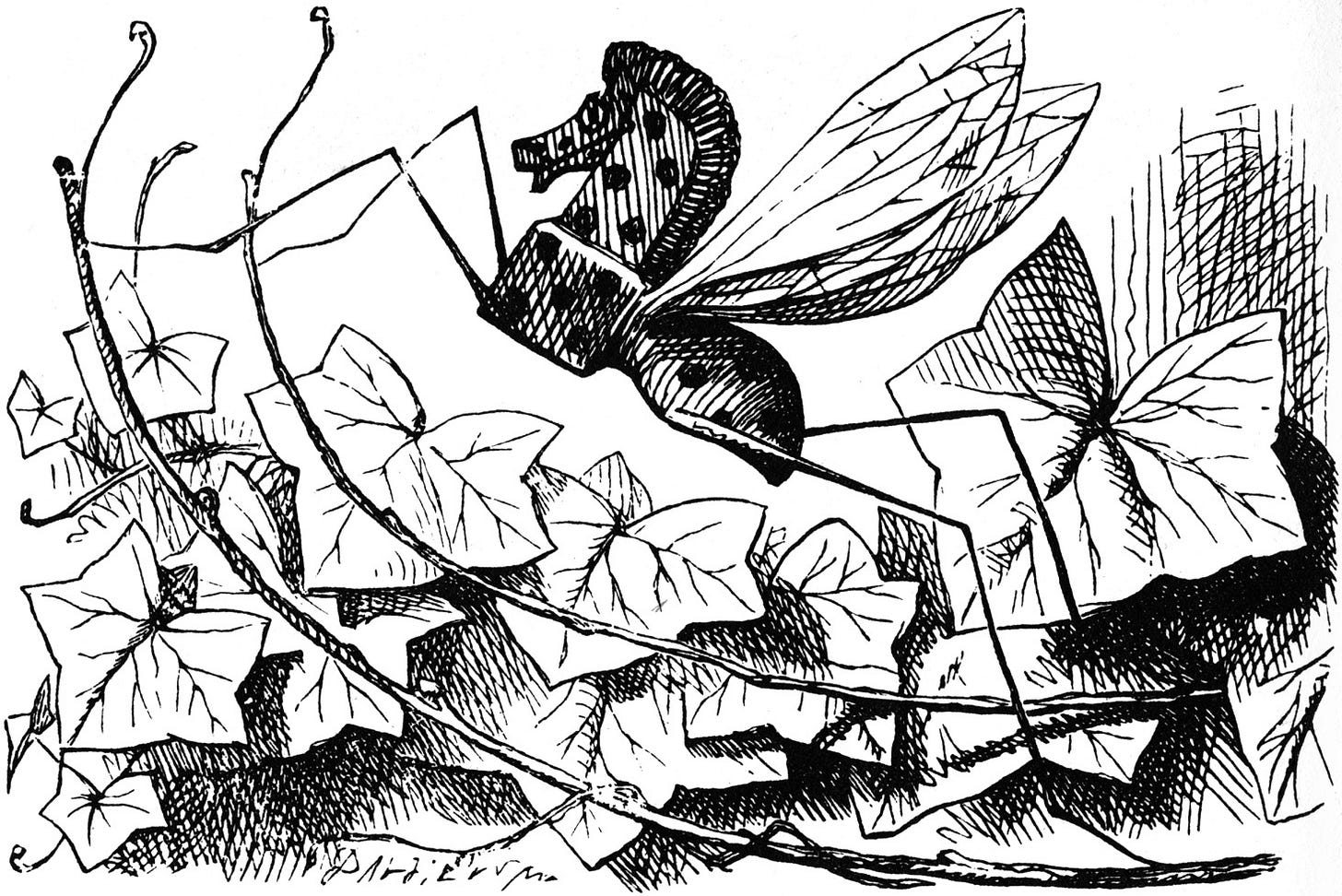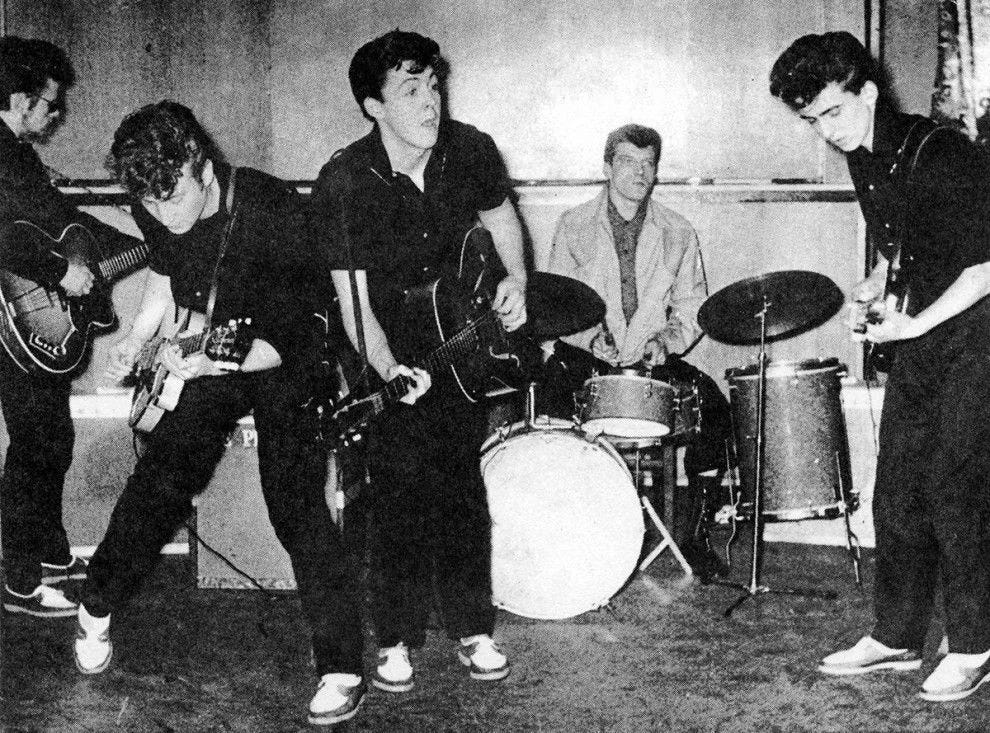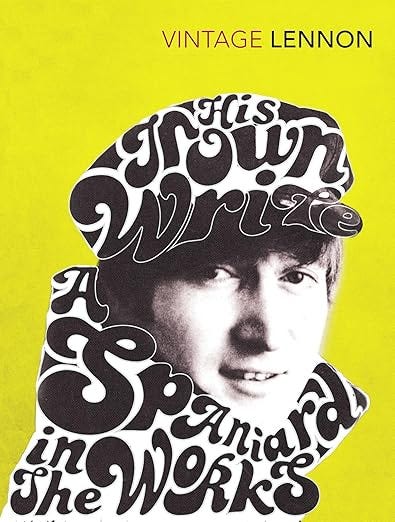29 Beatles, with an 'A'.
The man on a flaming pie and Carroll's aural puns.
Each week on Alice & The Eggmen we’ve been exploring songs, films, and cultural connections between Lewis Carroll and The Beatles. Next week will be the 30th episode, with yet more to come. But one glaringly obvious thing we’ve not yet discussed is the most ubiquitous: the name of the band itself. While it’s not explicitly an Alice reference, it’s very Carrollian in spirit, one of those ‘ingested’ references, like this “rocking-horse-fly”.
I almost feel embarrassed pointing out the glaringlyobvious, but my wife always tells me not to assume things are equally obvious to everyone, so here goes: the name ‘Beatles’ combines an insect reference with the beat music of the time. Beatles - with an A - is an aural pun, creating multiple meanings out of one word, a linguistic game that would have pleased Dodgson as much as it pleased Lennon and the fabs.
So let’s take a deeper look at how it came about, and how both embraced plays on words in their creative process.
On Page 2 of the first issue of Bill Harry’s Mersey Beat, John Lennon wrote his biography of the origins of the group, which Bill Harry titled “Being a Short Diversion on the Origins of Beatles (Translated from The John Lennon).” In it, Lennon wrote the following:
“Many people ask what are Beatles? Why Beatles? Ugh, Beatles, how did the name arrive? So we will tell you. It came in a vision – a man appeared on a flaming pie and said unto them ‘From this day on you are Beatles with an ‘A’. Thank you, mister man, they said, thanking him.”
-John Lennon, Mersey Beat (July 6-20, 1961).
Elevating a game with words into spoof myth-making is a hallmark of Carroll, with mock epics showing up as things like Jabberwocky or The Hunting of the Snark. But it’s also a classic Lennon move, that highlights and simultaneously undermines the myth of the artist, the creative act. Lennon tends to demean and undermine his own work in interviews, and was first to say that the name was a “bad pun”. And yet, when Lennon constantly points out the randomness and banality of creativity - “it was just….”, “I just thought…” - for me it only goes to reinforce it. Being honest about serendipity doesn’t pop my artistic ‘ah-hah’ bubble. It shows how openness to the outside is a natural part of the process.
There’s an entymological precedent of course. For a few short months, from May to August 1960, The Beatles were The Silver Beetles (with an ‘e’).1
And that’s because John loved the idea of Buddy Holly’s backing band name, The Crickets. But since that was taken, as McCartney pointed out, Stuart Sutcliffe proposed “beetles”. For a short time they even played with “the Beatals”. And then came the man on the flaming pie, descending from the heavens with a punning bequest.
Carroll, of course, doesn’t own these kinds of games based on hearing and mishearing. They’re part of the literary tradition. The Richard III opening soliloquy - ‘now is the winter of our discontent’ (coincidentally quoted by George about the Let It Be sessions), plays on son / sun, to give but one example.
So it’s not unique. But it is a favourite of nonsense verse writers. And Carroll, whose language John ingested from an early age, loves a play on words, from naming the hare ‘Haigha’ (a sonic pun) to other hearing-based aural jokes:
“Lessons lessen from day to day”
-Lewis Carroll, Alice's Adventures in Wonderland, Ch. 9
Or…
“We called him Tortoise because he taught us” (ditto)
John’s songs are replete with neologisms - ‘walrus gumboot’, ‘craberlocker fishwife’ or ‘nutopia’ in the solo era. But for the more humorous word games we need to turn to the poetry, specifically the volumes published as ‘In His Own Write’ and ‘A Spaniard in the Works’:
The titles of these collections alone would be enough to make the point: ‘write’ rhymes with ‘right’ and the Spaniard in the works replaces the similar-sounding ‘spanner’ from the everyday idiom. By drawing attention to potential mishearings, John reminds us of the malleability and inherent poetry of language - he destabilises common connections.
And a quick scan of the table of contents of A Spaniard In The Works reminds us just how deep the punning runs, from “Last Will & Testicle” (testament), to “The General Erection” (election) and “Readers Lettuce” (letters)!" And that’s just the titles.
The punning continues within the poems themselves:
“He’d been abroad — and I do mean a broad.”
-John Lennon, ‘The Singularge Experience of Miss Anne Duffield’, A Spaniard in the Works, 1965)
It’s not subtle, but it’s funny. Today we’d probably call them ‘dad jokes’. And early John in particular was a devotee. It underscores his sense of humour and his irreverence - qualities that were hallmarks of The Beatles’ output and, especially early-on in press conferences:
“I’m John… I play the guitar… sometimes I play the fool.”2
Alice-ry is there in the images (‘…a boat on a river’). It’s there in characters (the Walrus, the Duchess of Kirkaldy…). It’s there in the sounds. And it’s a naming inspiration.
Let there be Beatles with an A.
See you next time.
Silver Beetles gigs in 1960:
May 30th: Jacaranda Coffee Bar, Liverpool, England
June 2nd: The Institute, Neston, Wirral, England (As 'The Beatles')
June 4th: Grosvenor Ballroom, Wallasey, England
June 6th: Grosvenor Ballroom, Wallasey, England
June 9th: The Institute, Neston, Wirral, England (As 'The Beatles', last show with Tommy Moore on drums)
June 11th: Grosvenor Ballroom, Wallasey, England
June 13th: Jacaranda Coffee Bar, Liverpool, England (First show with Norman Chapman on drums)
June 16th: The Institute, Neston, Wirral, England
June 18th: Grosvenor Ballroom, Wallasey, England (Paul McCartney's 18th birthday)
June 23rd: The Institute, Neston, Wirral, England
June 25th: Grosvenor Ballroom, Wallasey, England
June 30th: The Institute, Neston, Wirral, England
July 2nd: Grosvenor Ballroom, Wallasey, England (With Johnny Gentle on lead vocals. Last show with Norman Chapman)
July 7th: The Institute, Neston, Wirral, England (First show with Paul McCartney as drummer)
July 9th: Grosvenor Ballroom, Wallasey, England
July 16th: Grosvenor Ballroom, Wallasey, England
July 23rd: Grosvenor Ballroom, Wallasey, England
July 30th: Grosvenor Ballroom, Wallasey, England
Live at the BBC” intros (circa 1963–1964)







you can't beat a good pun ...